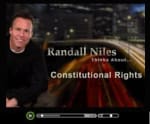Separation of Church and State
Separation of Church and State – In the Constitution
An honored principle of American law is the “separation of church and state.” Americans differ sharply as to what the country’s founding fathers intended when this principle was incorporated into American law and what the principle should mean in practice today. These disputes stem from differing views about fundamental truth and the importance of belief.
The words “separation of church and state” are not expressly in the U.S. Constitution. Instead, there are just three references to the relationship between religion and government in the Constitution. The first, in Article VI, section 3, says that no religious test shall ever be required as a qualification to hold public office. The second two constitutional references to religion are found in the First Amendment. The first, known as the Establishment Clause, provides that the government shall make no law respecting the establishment of religion. The second, known as the Free Exercise Clause, provides that the government shall make no law prohibiting the free exercise of religion.
Separation of Church and State – An Interpretation of the First Amendment
The well-known phrase, “wall of separation between church and state,” is actually a reference to a phrase used by President Thomas Jefferson to describe the function of the First Amendment in a letter in 1802. The phrase did not become part of U.S. jurisprudence until more than 75 years later when the U.S. Supreme Court stated that it was an “almost” authoritative explanation of the First Amendment (but then nevertheless interfered with a Mormon’s free exercise of his religion since it included polygamy). Since 1947, the courts have frequently used the phrase in deciding First Amendment cases.
At minimum, the separation of church and state means that the U.S. is not a theocracy, as is the case in some Middle Eastern countries. Americans do not believe that the country’s leader rules by divine right or has divine powers. It also means that the church and the government are separate institutions and neither directs the internal affairs of the other. The government is not involved in choosing church leaders and these leaders do not serve in government in their role as church leaders (although they may be elected or appointed to government positions in their capacity as ordinary citizens), as is true in England. In addition, in 1947 with the case of Everson v. Board of Education, the U.S. Supreme Court began to hold that the separation of church and state means that there should be virtually no contact between religious ideas and government activity.
Separation of Church and State – The Controversy Today
While the Supreme Court’s current position on the separation of church and state protects those of minority faiths or no faith, it often leaves those of majority faiths feeling that their free exercise of religion is being infringed. It is also deeply troubling to those who believe that faith is necessary, or at least conducive, to moral and lawful living. The Court’s position has also become increasingly controversial as the role of government has expanded through the years. Because the government is involved in many aspects of community life today, from maintaining the public school system to administering many social benefits, preserving a strict wall between state and any religious idea pushes religion to the margins of public life. Many Americans believe this is a result the Country’s founding fathers never intended.
Separation of Church and State – Differing Interpretations
There are two main schools of thought as to how the courts should interpret the minimal references to religion in the Constitution and apply them today.
-
Original understanding or intent. Some Americans believe the courts should make every attempt to discern what the original drafters of the Constitution and First Amendment intended at the time of drafting and apply this intent to today’s circumstances. They argue that this is the law of the land enacted by the people through legal procedure and can be altered only by Constitutional amendment. This view tends to favor a greater level of government accommodation toward religion since it is undisputed that government at the time the Constitution and First Amendment were adopted both recognized and respected religious belief and made many allowances for the religious nature of Americans, including public prayer and Bible reading.
- Moral understanding or intent. Others argue that the Constitution reflects certain principles of general morality which courts must translate as best as possible into current reality, adapting as necessary.
Read Separation of Church and State Page 2 Now!
What is your response?



